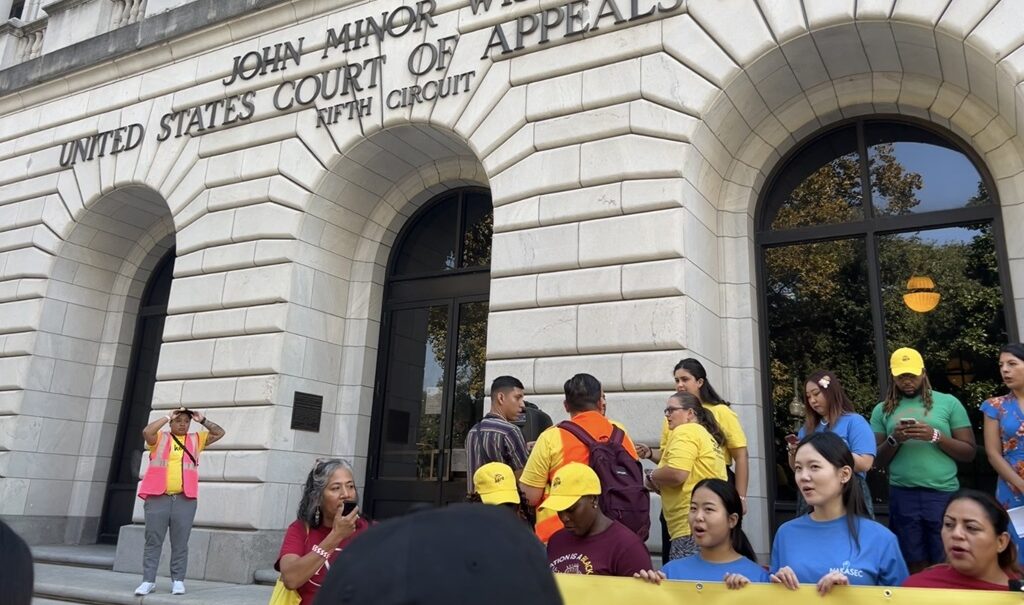The American Immigration Council does not endorse or oppose candidates for elected office. We aim to provide analysis regarding the implications of the election on the U.S. immigration system.
Written by Ilse Ramirez, Paralegal, and Andrea Rathbone Ramos, Digital Communications Specialist
The Fifth Circuit Court of Appeals in New Orleans, Louisiana, heard oral arguments on the Deferred Action for Childhood Arrivals (DACA) initiative on October 10. The court is deciding whether DACA is unlawful, potentially paving the way for another Supreme Court fight.
Meanwhile, the decision will impact the lives of over 500,000 undocumented young adults who were brought to the United States as children—myself included.
Currently, DACA recipients are permitted to renew their status every two years. Though U.S. Citizenship and Immigration Services is accepting initial applications and filing fees, new applications cannot be processed or approved.
As a DACA recipient who can renew every two years, I can’t help but think of the many individuals with pending first-time applications. DACA is a double-edged sword. It opened many doors, enabling me to pursue higher education, apply for a driver’s license, and gain legal employment. Yet, it also serves as a constant reminder that there is no pathway to citizenship for people like me, and our temporary protection from deportation can be revoked at any moment.
The initiative was started under the Obama administration in 2012, providing relief to many undocumented immigrants brought to the U.S. as children. Since then, DACA has faced numerous legal challenges. Most recently, in 2023, U.S. District Judge Hanen ruled the program unlawful. While this ruling allowed current recipients to renew their status, it also prevented the approval of any initial applications, leaving hundreds of thousands of people, including those I deeply care about, in a state of uncertainty and fear.
Terminating the DACA program would have a massive national economic impact. Our latest Map the Impact data indicates that DACA-eligible individuals contribute billions to the U.S. economy. Over 96% of DACA-eligible people are currently employed. The employment authorization that DACA provides allows recipients to pursue higher education and better job opportunities, increasing their incomes and economic contributions to their communities. As their income rises, so do their tax contributions, positively influencing local, state, and federal economies. Furthermore, data suggests that DACA recipients are highly entrepreneurial; approximately 73,000 have launched their businesses, creating job opportunities for Americans and driving economic growth.
It doesn’t just end there. It’s not just us who know that DACA recipients are essential to our economy and that ending DACA would have disastrous outcomes. For example, the Cato Institute estimates that deporting DACA recipients would cost $60 billion and result in a $280 billion economic loss over the next decade.
Beyond financial costs, deporting DACA recipients would harm local businesses, schools, and economies dependent on their contributions. From educators to entrepreneurs, their absence would leave significant gaps in communities nationwide.
And on a personal level, it would devastate families like mine across the country.
You see, this isn’t just about DACA. It’s about keeping families together. Over 250,000 U.S. citizen children have DACA recipient parents, and 1.5 million people live in mixed-status families. Losing DACA could lead to heartbreaking separations, leaving children without parents, spouses across borders, and elderly family members without support. The emotional toll of forced separations is immeasurable, affecting not just the families involved but entire communities.
Then there is the psychological fear that becomes ingrained, as you never know if your family will be safe. As someone who has lived in this reality, I know that the fear of separation is always present. It pains me to know that more children will experience this lifetime of uncertainty and trauma, which is why Congress needs to act.
The timeline for the Fifth Circuit’s ruling is uncertain; they could rule against DACA again, effectively ending the program that supports many undocumented individuals.
DACA recipients need permanent protections, not temporary solutions. It’s time for Congress to pass legislation that provides a path to citizenship for undocumented youth and ends the constant uncertainty. Whatever comes from October 10th, any future decision could reshape the future of thousands of families. It is irresponsible to wait for the unknown. True security will only come through lasting reform.
FILED UNDER: Fifth Circuit













